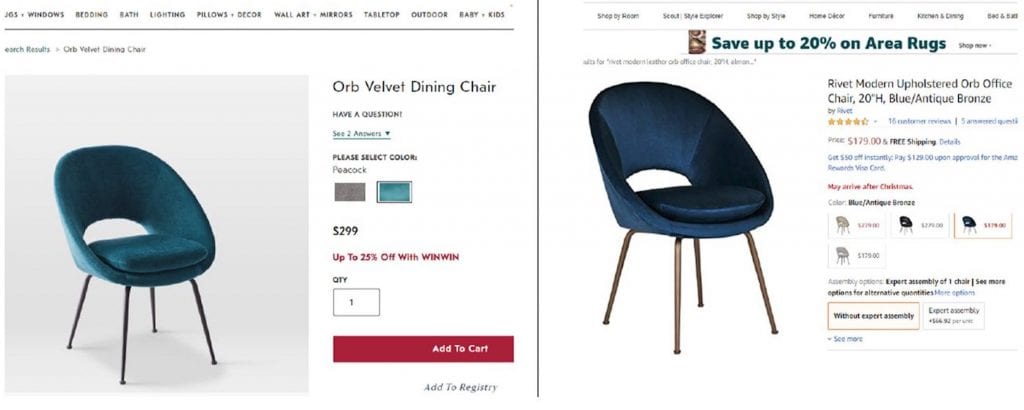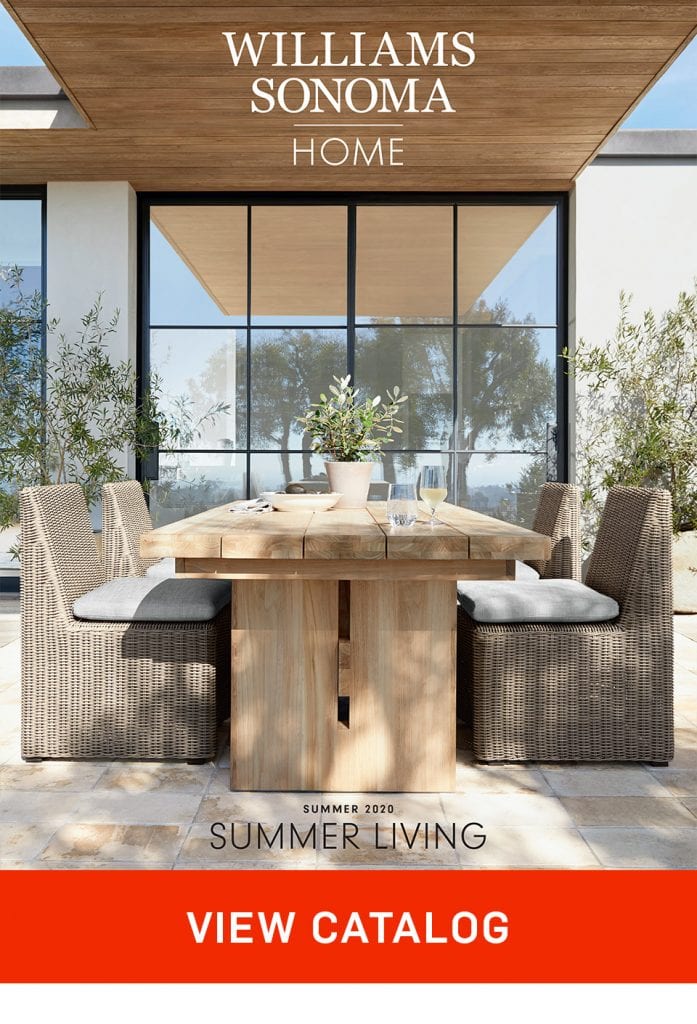Amazon is being sued for copying in the latest potential blow to the legality of the products being offered up by its ever-growing stable of private labels. Williams-Sonoma slapped Amazon with a trademark and design patent infringement lawsuit in a federal court in California, alleging that the American e-commerce giant is on the hook for hijacking one of its legally-protected chair designs, as well as the “very same non-descriptive terms [that Williams-Sonoma-owned company West Elm] uses in connection with these products.”
According to Williams-Sonoma’s complaint, Amazon has been marketing and offering for sale a lower-priced but “nearly identical” version of West Elm’s $300 Orb chair, which is known for its “cutout back, and curved, scooped-back frame,” and has utilized some of the very same language as West Elm uses to depict its chair. In addition to the “striking similarity” of the two companies’ chairs, Amazon has also given its product a similar “Orb” name.
Williams-Sonoma claims that it “is implausible Amazon could have conceived of a product line with nearly identical product designs which feature product names containing the very same non-descriptive terms WSI uses in connection with these products, other than by intentionally undertaking to copy [its] West Elm product line.” The alleged infringement at hand, the homewares company claims, is in line with Amazon’s larger practice of “unfairly and deceptively engag[ing] in a widespread campaign of copying.”
Beyond its Rivet private label’s Orb chair, Williams-Sonoma – which is seeking monetary damages and injunctive relief – is accusing Amazon of maintaining an unauthorized Williams-Sonoma-branded storefront on its website and misrepresenting itself as an authorized seller of the company’s products, thereby, resulting in damage to its brand and confusion amongst consumers, and ultimately, running afoul of trademark law.

This is at least the second lawsuit in less than a year that Amazon has faced in connection with its private labels. In April, Amazon was sued by Seven For All Mankind International, which called attention to Amazon’s “egregious, willful and wanton activities” in connection with Seven’s Ella Moss label.
According to Seven’s lawsuit, Amazon is running afoul of trademark law in connection with its similarly-named private label, Ella Moon. Seven, which sells its contemporary Ella Moss brand on Amazon, claims that the Seattle-based giant has taken to using an “infringing Ella Moon trademark.” In addition to sharing similiar names, Seven alleges that Amazon’s mark is similar to Ella Moss “in sound, appearance, connotation and commercial impression” and the garments, themselves, maintain a markedly similar aesthetic, including “the same types of women’s apparel, and in the same ‘bohemian-chic’ casual style, as the Ella Moss brand.” Still yet, the Ella Moon collection is being sold at similar price points as Ella Moss, a move to further confuse consumers as to the source of the Ella Moon brand, per Seven.
Amazon’s Rivet furniture collection joins over 40 other Amazon private labels, which are, according to L2 Digital, gaining traction amongst consumers, particularly in light of the current retail environment, when brand loyalty is low, consumers are overly price/value conscious, and branding is simply not as significant a player as it used to be. It is within this landscape that private labels are positioned to thrive.
A rep for Amazon said the company is “not commenting” on the suit.
UPDATED (November 3, 2020): The parties have agreed to settle their suit out of court, with the details of the resolution remaining confidential. The settlement was first reported by Bloomberg, which noted that in response to Williams-Sonoma’s suit, Amazon “contested [the company’s] trademark allegations under the first-sale doctrine, which allows resellers to use the original producer’s trademarks to identify its products.” Asking the court to toss out the case, Amazon asserted in a February 2019 filing that it should be shielded from infringement liability for merely using Williams-Sonoma’s trademark to identify the products at issue.
In a decision dated May 2, 2019, the court sided with Williams-Sonoma. According to U.S. District Court Judge Elizabeth Laporte, the decision was a “close call,” but she enabled the case to move ahead, holding that Williams-Sonoma “raise[d] the plausible inference that Amazon is not merely reselling Williams-Sonoma products, but is instead cultivating the incorrect impression that these sales on amazon.com are authorized by Williams-Sonoma.”
*The case is Williams-Sonoma, Inc. v. Amazon.com, Inc., 3:18-cv-07548 (N.D.Cal.).











